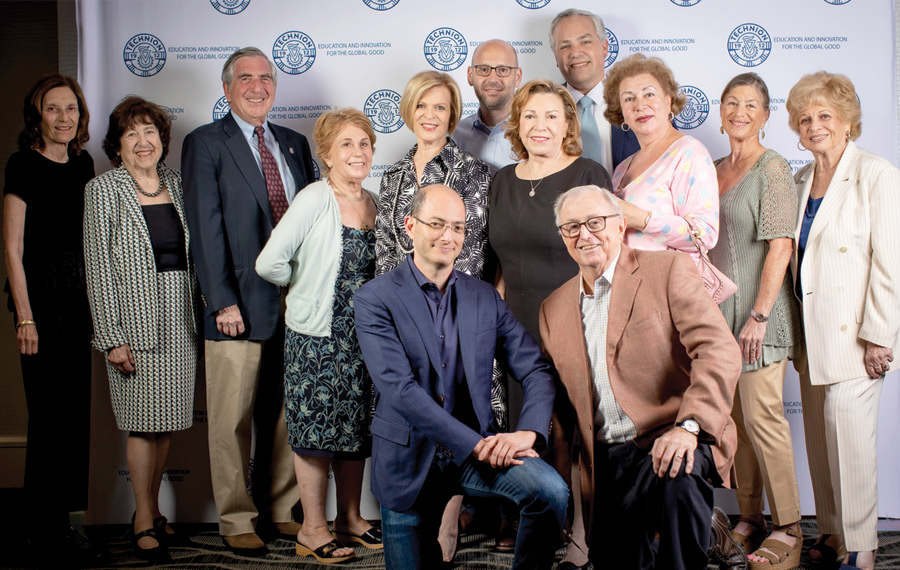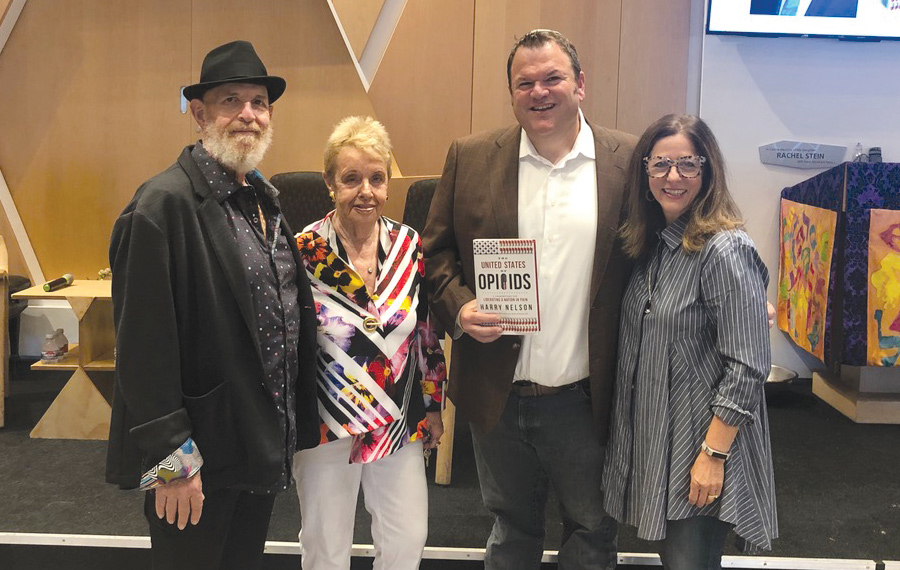 Attendees at the Technion discussion included (back row, from left) Technion Professor Itamar Kahn; ATS board member Michael Steuer; (second row, from left): ATS board members Marilyn Strumwasser; Joan Seidel; Charles Levin; Sherry Altura; Janey Sweet; Oli Halfon; Regina Shrekenhamer; Karren Ganstwig; Ruth Flinkman-Marandy and (front row, from left) ATS board members Mark Dorner and Robert Hanisee. Photo courtsey of of the American Technion Society
Attendees at the Technion discussion included (back row, from left) Technion Professor Itamar Kahn; ATS board member Michael Steuer; (second row, from left): ATS board members Marilyn Strumwasser; Joan Seidel; Charles Levin; Sherry Altura; Janey Sweet; Oli Halfon; Regina Shrekenhamer; Karren Ganstwig; Ruth Flinkman-Marandy and (front row, from left) ATS board members Mark Dorner and Robert Hanisee. Photo courtsey of of the American Technion Society During a visit to Southern California, Technion associate professor Itamar Kahn led a conversation with community members about his and his team’s dedication to understanding the science of Alzheimer’s, Parkinson’s, ALS and other brain disorders.
The discussion, held on Aug. 6 at the InterContinental Hotel in Century City, was titled “Autism to Aging: Innovative Methods for Tackling Neurological and Neurodegenerative Disorders.”
Kahn studies brain function in health and disease, focusing on failures in organization that result in disrupted communication across brain systems. He is the director of the Technion’s Allen and Jewel Prince Center for Neurodegenerative Disorders of the Brain.
The American Technion Society, which raises funds and awareness for the Technion-Israel Institute of Technology, organized the evening.

Jewish rehabilitation agency Beit T’Shuvah held an Aug. 25 event in Culver City featuring author Harry Nelson and Beit T’Shuvah founder Harriet Rossetto in conversation with Rabbi Mark Borovitz, founding rabbi at Beit T’Shuvah.
The topic was “The Opioid Epidemic Is Also a Jewish Problem” ahead of International Overdose Awareness Day on Aug. 31.
Nelson’s book, “The United States of Opioids: A Prescription for Liberating a Nation in Pain,” offers a comprehensive picture of how the opioid crisis evolved and what tangible steps people can take to address this issue. For their part, Rossetto and Borovitz have been treating addiction for over 30 years through Beit T’Shuvah’s unique treatment, which combines Jewish teachings, spirituality, psychology and the 12 steps to help those struggling with addiction.
“Beit T’Shuvah allows residents to stay in treatment for up to a year regardless of their financial situation and uses Judaism and spirituality as an integral part of recovery,” a Beit T’Shuvah statement said.
Attendees received a copy of Nelson’s book. They included Janice Kamenir-Reznik, board chair at Beit T’Shuvah.
Nelson, founder and co-managing partner of the L.A.-based law firm Nelson Hardiman, is considered a leading healthcare attorney and top expert on the future of U.S. healthcare.

Valley Village bike riders Dr. Jan Moore and Moshe Kinsbursky joined 575 riders from across the U.S., Mexico and Canada to participate in the 10th annual Bike4Chai, held Aug. 14-15.
Bike4Chai is a two-day, 180-mile bike ride and the top fundraising event for Chai Lifeline, which has grown from a small, community-based summer camp program for children who have cancer to one of the preeminent international health support networks supporting seriously ill children, their families and communities.
Bike4Chai raised $10 million for Chai Lifeline. Together Moore and Kinbursky raised over $19,000.
During the first day, riders traveled 109 miles from Princeton, N.J., through the Pocono Mountains of Pennsylvania, finishing at the Kalahari Resort. That evening, Camp Simcha kids joined the riders in a joyous celebration. The next day, the riders rode the rest of the way to Camp Simcha in Glen Spey, N.Y., where hundreds of family members and volunteers celebrated the riders’ arrival, campers presented each rider with their finisher’s medals and a celebration ensued among campers, staff and riders with music and dancing.
“The energy was off the charts,” Moore said. “It was incredibly emotional to see the pure joy and simcha in the eyes of the campers as we continued singing and dancing with the kids. All the work we did raising money and training came to an amazing conclusion. Seeing the campers and knowing the challenges they face made all our work training seem trivial.”
“We were happy to do our part to help this wonderful organization,” Kinsbursky said. “Hopefully, next year Team L.A. will have an even bigger team for
Bike4Chai 2020.”
Matt Baram has been named the executive director of Hillel 818, which serves more than 6,500 students at Cal State Northridge, Pierce College and Los Angeles Valley College, effective July 1.
Before joining Hillel 818, Baram spent eight years as the millennial director at Sinai Temple. He succeeds Hillel 818’s longtime executive director, Dave Katz.
“The Hillel 818 board and community stakeholders are thrilled to welcome Matt Baram as our new executive director,” Kathi Mangel, chair of the Hillel 818 board, said in a statement. “Matt brings enthusiasm, creativity and a drive to connect with Jewish students throughout our community. He is dedicated to ensuring continued growth and development of this Hillel for the benefit of all the students served today and for many years to come.”
Dave Cohn was named the Allen and Ruth Ziegler Executive Director at USC Hillel, which serves Jewish undergraduate and graduate students, as of July 1.
According to the USC Hillel website, Cohn previously worked as the director of Emory Hillel in Atlanta, retooling its campus engagement internship while achieving recognition from Hillel International.
The Chicago native is a former camper and staff member of the Olin-Sang-Ruby Union Institute, a Jewish summer camp in Wisconsin. He also previously worked in development and strategic projects for Hillel at UCLA and as a music educator in public school and synagogue settings.

Ahead of the High Holy Days, the Central Conference of American Rabbis (CCAR) led a contingent of more than 50 Reform rabbis from across the country to Montgomery and Selma, Ala., “on a journey of truth, justice and reconciliation,” according to CCAR.
The visit took place from Aug. 19-21, during which time rabbis took part in discussions with leading scholars, clergy and activists about the history of and current racism in the U.S. They also visited sites including the Legacy Museum and the National Memorial for Peace and Justice.
According to CCAR, the participating rabbis used the visit as an opportunity to “discuss how Jewish communities, and the country as a whole, can confront our nation’s history and the present reality of racial injustice.” They also explored how the issue of reproductive rights is being debated in Alabama and throughout the South, where they have been laws passed that restrict a woman’s access to abortion.
In a statement, Rabbi Hara Person, chief executive of CCAR, said the trip reinforced the important part the Jewish community plays in confronting racism.
“Reform rabbis in particular have a key role to play in advancing all forms of justice, including racial justice, in our communities,” Person said. “The High Holy Days provide us the opportunity and the obligation to repent for not just our individual sins but for our harmful actions as a society.”
Rabbi Betsy Torop, director of rabbinic engagement and growth at CCAR, said the trip was in line with the mission of CCAR, a Reform rabbinic leadership organization.
“The CCAR has a long history of confronting injustice in many areas, including racial justice,” Torop said in a statement. “This seminar continues CCAR’s proud tradition as a leading Jewish voice on racial justice throughout its history as rabbis recommit themselves to advancing this cause in our own time.”
Trip leader Rabbi Seth Limmer of the Chicago Sinai Congregation and Rabbi Judith Schindler, the CCAR Montgomery seminar leader, also participated.
“This sacred journey provides an opportunity to renew the Jewish commitment to racial justice,” Limmer said.
Wanna be in Movers & Shakers? Send us your highlights, events, honors and simchas.
Email ryant@jewishjournal.com.





















 More news and opinions than at a Shabbat dinner, right in your inbox.
More news and opinions than at a Shabbat dinner, right in your inbox.